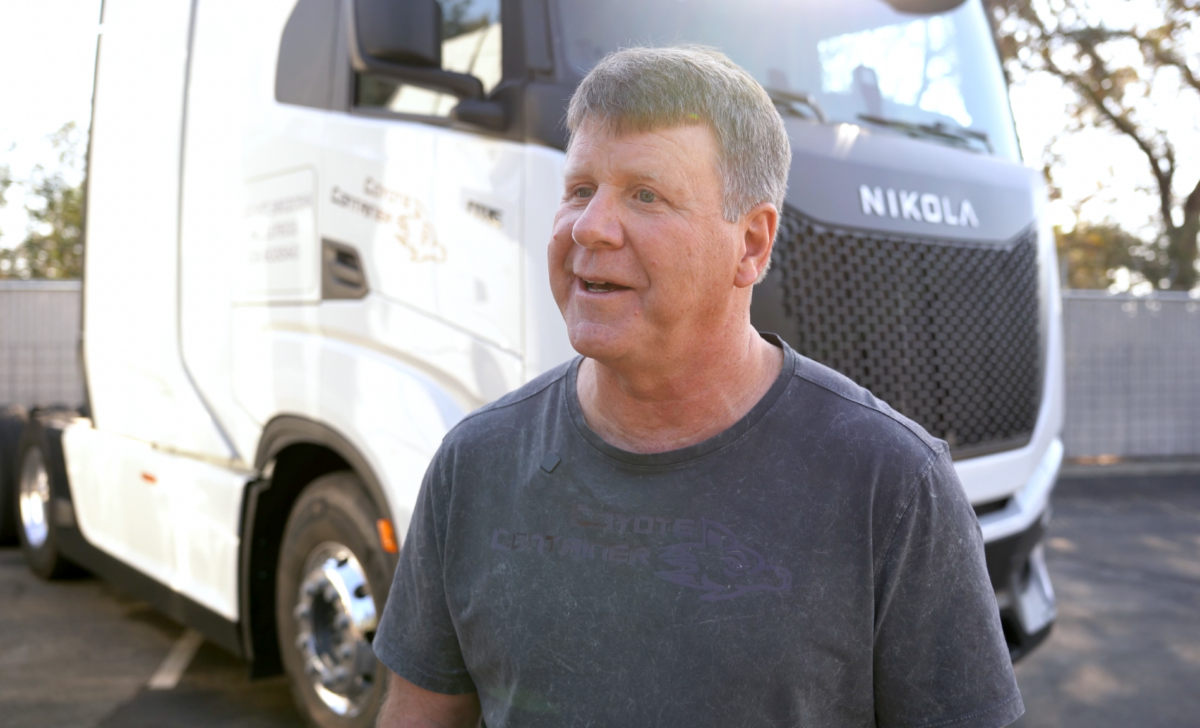Freight News:
Early Nikola fuel cell truck buyer confident about hydrogen fuel
Bill Hall left his job as a senior marine engineer at age 59, earned his CDL and started Coyote Container with two trucks and one trailer in Northern California.
Now he is among the first retail purchasers of a zero-emissions Nikola fuel cell electric truck.
Was this newsletter forwarded to you? Click here to get Truck Tech via email on Fridays. And catch the latest in major events and hear from the top players on Truck Tech at 3 p.m. Wednesdays on the FreightWaves YouTube channel.
Pragmatist or pioneer?
Hall sees himself as more of a pragmatist than a pioneer. He paid cash for a hydrogen fuel cell-powered Class 8 Tre after a $360,000 spiff from the California Hybrid and Zero-Emission Truck and Bus Voucher Incentive Project (HVIP). Hall did not disclose how much he paid for his truck.
“It [cost] me less than buying a [new] diesel drayage truck,” Hall told me in an interview this week. “It depends what you’re looking at. But different brands that would work for my use were in the $225,000 to $250,000 [range].”
Hall expects to put 40,000 to 50,000 miles a year on the Nikola Tre, driving it with loads anywhere in California that he would be able to refuel with hydrogen. So far, there are just a few stations capable of transferring 50 kilograms of super-chilled hydrogen gas into his truck.
Bill Hall of Coyote Container is among the first retail customers for the Nikola Tre hydrogen-powered fuel cell electric truck. (Photo: Nikola)
Hunting for hydrogen
Once a week — sometimes more often — Hall travels from the Port of Oakland to Southern California, about 400 miles. A fuel cell Tre can make the trip on a single fill, which takes as little as 22 minutes. Hall is required to take a 30-minute break as part of a maximum 11-hour day under federal hours-of-service regulations.
“Wherever I know there’s [hydrogen] supply and range, I’m going to use it,” Hall said.
According to the Hydrogen Fuel Cell Partnership, California has 55 hydrogen fueling stations. Most target fuel cell passenger vehicles.
“Those stations are designed to deliver to a small car that’s taking 3 to 5 kilograms,” Hall said. “Our needs are much greater. It’s a growing pain.”
But he is optimistic for a build-out of hydrogen infrastructure by established businesses like FirstElement Fuel and stations planned under Nikola’s Hyla brand with partners Voltera and BP-owned TravelCenters of America.
“There is a Hyla station down in Southern California, so that’s the one I plan to use for now,” Hall said. “They’re working on a second mobile fueler that’s actually closer to the port. So it’ll be great when that comes online.
“The hydrogen supply industry is an interesting study. The prices are projected to come to parity [with diesel] in the near term and less than half in the longer term. I have pricing that I think will work in my use model.”

Bill Hall changed careers at 59 to become a truck driver. His is among the first to purchase a zero-emissions fuel cell electric vehicle. (Photo: Nikola)
Nikola built 42 FCEVs in Q4 and sold 35 at wholesale
Nikola built 42 fuel cell electric vehicles (FCEVs) in the last three months of 2023 and wholesaled 35 of them to Tom’s Truck Center in Santa Ana, California, Ethero in Mechanicsville, Virginia, and ITD Industries in Toronto. The company did not say how many were in customer hands, only that it was “in the process of deliveries.”
Hall received his Tre FCEV on Dec. 13, his 61st birthday.
“I went to the [Advanced Clean Transportation Expo] in 2019. That’s where I became aware of Nikola,” Hall said. “I began calling Nikola because I knew they were developing this hydrogen truck, and I never stopped bugging them. I had to get their corporate phone number to call them because there really wasn’t any sales [team].”
Fast forward five years. Nikola is building a sales team in Southern California to press its first-mover advantage and capitalize on HVIP incentives like Hall’s that can dramatically cut the $450,000 base price of the Tre FCEV.
“I see this whole evolution in a broader sense,” Hall said. This technology is going to blossom and spread to other industries. The trucking industry’s way, way, way ahead, and Nikola is the only one that has a truck you can use.” dating and taking costs out of Aurora Driver hardware for Volvo and Paccar trucks.
Finalizing the hardware architecture, specs and requirements is a big deal because it is foundational for eventually making Aurora profitable.
“From day one, we knew we’d need to build a strong ecosystem of partners to bring this technology to market safely and at a commercial scale,” said Chris Urmson, Aurora co-founder and CEO. “Finalizing the design of our future hardware is a meaningful step toward making the unit economics of the Aurora Driver compelling and building a business for the long term.”
The post Early Nikola fuel cell truck buyer confident about hydrogen fuel appeared first on FreightWaves.
Source: freightwaves - Early Nikola fuel cell truck buyer confident about hydrogen fuel
Editor: Alan Adler